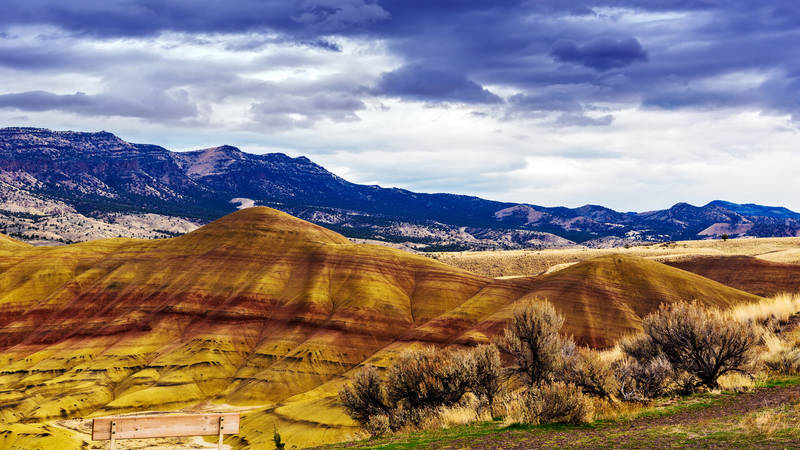Camp NPCA is officially in session! As NPCA celebrates National Park Week, we’re evoking all the nostalgia and fun of summer camp with a national park protection twist.
Every April, the National Park Service and its partners dedicate nine days to celebrating all things national parks and the work it takes to protect them. In our support of National Park Week, NPCA is unveiling our biggest salute yet by introducing park advocacy badges. You can earn these iron-on badges during National Park Week (and all year!) by advocating for national parks. The badges are 2 inches in diameter and serve as a memento of our favorite week of the year, while offering park enthusiasts a chance to deepen how they connect to and protect our parks.
You can buy the badges at any time through our newly relaunched Park Store, but it’s on the honor system when it comes to earning them! There are plenty of ways to earn each badge and strengthen your park advocacy muscles along the way.
Climate change
A majority of Americans across political affiliations agree climate change is negatively impacting national parks, but through swift and comprehensive climate action, we can reduce the damage to them. Nearly everything we know and love about the parks — their plants and animals, rivers and lakes, glaciers, beaches, historic structures, and more — is already under stress from climate changes. Here are a few ways you can earn your “climate change” badge and fight for healthy parks for all.
- Learn: Read about how the climate crisis affects our parks.
- Act: Ditch single-use plastic and focus on reuseable, recyclable or compostable containers for your park snacks and water.
- Use your voice: Send a message to Congress reminding them that our parks are worth fighting for and urge them to swiftly equip the National Park Service with cutting-edge climate science and management practices.
- Start a conversation: Reflect on how climate change is shifting the landscapes you love through a craft, sketching, or other art project and share it with your community.
History and culture
Two-thirds of our national parks are explicitly dedicated to history and culture, and 100% of them help tell the American story. Yet, the role the National Park Service plays in protecting and interpreting our history is often overlooked and largely underfunded. NPCA is currently advocating for $250 million in new funds so the Park Service can hire more historians and better protect almost 185 million historic artifacts. NPCA is also working to ensure that our shared heritage is both protected and inclusive of all American stories by advocating for new park sites and expanding existing storytelling efforts.
- Learn: Read up on “Positioning Pullman” and the creative efforts behind a community-driven plan that contextualizes and enhances Chicago’s first national park site.
- Act: Pay a visit to a national historic site you haven’t been to before — there’s probably one closer to you than you think! Before you go, read up on how NPCA helped sites such as Pullman National Monument and Stonewall National Monument come to be.
- Use your voice: Just because a landscape is a national park site doesn’t mean it doesn’t face ongoing threats. Stand up for Chaco Culture National Historical Park and the broader Chaco landscape by supporting the plan to place a 20-year moratorium on new oil and gas leasing on federal lands within 10 miles of Chaco Canyon, honoring the region’s rich cultural sites and communities.
- Start a conversation: The next time you find yourself reading an interpretive placard, ask yourself and others around you what stories the park helps tell — and which ones are missing.
Write your reps
In 2022, nearly 30,000 advocates sent almost 300,000 messages to members of Congress and state lawmakers across the country speaking up for national parks. Your voice makes a difference, from the passing of the bipartisan Great American Outdoors Act to advocating for new parks, such as the Emmett Till and Mamie Till-Mobley National Monument.
- Act: Whether by phone, mail, social media tags or personal contact, there are many ways to reach your member of Congress to talk about the issues you care about.
- Use your voice: Sign up for our action alerts so you’re always the first to know about new NPCA campaigns and how to take action.
- Start a conversation: Talk to your friends and family about the future you envision for our national parks — and how advocating for things like better park funding can bring that vision to life.
Bring along a new friend
If you’ve ever brought a friend to your favorite park, you know the joy of watching someone you care about fall in love with a place. Our national parks are better when we share them and make sure everyone feels welcome in them.
- Learn: Engage the youngest park lovers in your life with ideas for creating memorable and fun park experiences with kids.
- Act: Strike up a conversation with someone new in a park — you already have one amazing thing in common. Practice respect and consider how we can all do our part to make the outdoors safe and welcoming.
- Start a conversation: Bring attention to the need to protect our parks by setting up an online fundraiser. Create a fundraiser for your birthday, to honor a loved one, to celebrate a park anniversary or just for the love of parks.
New perspective
If you play your cards right, every park offers a different experience on every visit. Step outside of your comfort zone to try something new to gain an entirely different perspective on your favorite places.

NPCA’s “new perspective” badge.
©Vanessa Pius/NPCA- Learn: Thinking about trying out solo adventures? NPCA’s Senior Manager, Internal Communications Abbey Robertson shares tips for taking the first step and how traveling on your own can deepen the park experience.
- Act: Download an app like iNaturalist or Merlin Bird ID to identify the sights and sounds around you.
- Use your voice: Half the park is after dark! At so many of our favorite sites, the show doesn’t start until after the sun sets. Stick around after dark to get a new perspective on the galaxy, and send a message to the EPA to hold states accountable for reducing air pollution so our skies stay clear.
- Start a conversation: Instead of a hike, invite your friends to join you for kayaking or rock climbing during your next park visit and take note of how the experience differs from a traditional trail.
Plan ahead
Our national parks are worth planning for, and you’re guaranteed to have the best possible experience if you do your research ahead of time. Make sure to check on the weather and visit park websites and social media for any updates that might affect your trip, such as storms, trail closures or events.
- Learn: Explore the role of managed access systems and learn from NPCA’s Senior Visitation Program Manager Cassidy Jones how visitation policies work to improve your experience.
- Act: Before you head to some of the most popular parks, check to see if you need a timed-entry reservation or parking pass.
- Use your voice: When a park is piloting a system to help manage crowds, share your thoughts by submitting a supportive public comment.
- Start a conversation: Help others’ experiences match their expectations by sharing your positive experiences on social media.
Alternate transit
Walking, biking or taking public transportation to and within parks when possible has many benefits, from reducing wildlife collisions to increasing access to parts of parks that can’t handle as much car traffic. A few national parks, including Denali and Zion, boast extensive shuttle systems to popular trailheads, which means visitors don’t have to rely on cars to get around. That’s especially helpful for folks visiting from out of town.
- Learn: Check out NPCA staffers’ favorite national park bike routes — and try one out!
- Act: Get off the beaten path and explore a park without a car, whether it’s by taking the ferry to Channel Islands or biking through Cuyahoga Valley.
- Use your voice: Speak up about the importance of safe bike paths to access urban parks such as Gateway National Recreation Area.
- Start a conversation: Educate your community about the dangers cars pose to wildlife, especially in national parks — and some of the solutions that can prevent roadside tragedies.
Fight for caribou
For years, NPCA has been fighting to protect the Western Arctic Caribou Herd and preserve the integrity of Gates of the Arctic National Park and Preserve by blocking the proposed 211-mile Ambler industrial mining road, which would slice through the Western Arctic caribou migration path — and a vast, priceless national park landscape. In a historic move, the Biden administration announced April 19 that the Bureau of Land Management intends to halt this proposed road through the Brooks Range of Northwest Alaska. We celebrate this victory for wildlife, water and people, but it’s important to keep showing leaders in Washington, D.C., and Alaska alike that this is an issue that the entire country cares about.
- Learn: Climb the Brooks Range with Alex Johnson, NPCA’s campaign director for the Arctic and interior Alaska, and gain a deeper understanding of what’s at stake in the fight against the Ambler mining road.
- Act: Listen to Native Alaskan voices — 66 Alaska Native Tribes would be permanently affected, putting at risk the lives of vulnerable community members and food sources for families. This land also connects communities’ past and future. The road would put all of this at risk.
- Use your voice: Pledge to continue to support and protect the Western Arctic caribou, Alaska Native communities and Alaska’s spectacular parklands.
- Start a conversation: Invite your friends to watch “Paving Tundra,” a free 30-minute documentary directed by Jayme Dittmar and James Q Martin, to learn more about one of the largest roadless areas on Earth, and why it should stay that way. You could even host your own screening.
Bucket list
With over 425 national park sites to visit, it can get tricky (and exciting!) to decide which one to visit next.
- Learn: NPCA’s blog has no shortage of listicles, from the best parks to visit in every season, to parks that tell lesser-known stories of women, Black Americans, the LGBTQ+ community, and more. We even have a list of (supposedly) haunted parks … first one to complete a full list wins!
- Act: Visit a national park site in your backyard — it just might become your new favorite place.
- Start a conversation: Track your park visits using the Parks of the USA Bucket List Bottle from Wondery Outdoors (which gives 3% back to NPCA!) —a surefire conversation starter anywhere you go.
NPCA membership
NPCA’s 1.6 million members and supporters make up a major force for park protection. You can join us!
- Learn: NPCA has been around since 1919 — walk through our first century of impact and the victories our members helped make happen.
Stay On Top of News
Our email newsletter shares the latest on parks.
- Act: Become a card-carrying park protector! Join NPCA as a member to stay informed about park issues and enjoy a free welcome gift.
- Use your voice: When you become an NPCA member, you also become a subscriber to our award-winning quarterly magazine. Read something inspiring? Write a letter to the editor.
- Start a conversation: Never wonder what you should listen to on your next park road trip — our award-winning podcast, “The Secret Lives of Parks,” has 28 episodes and releases a new one each month.
About the author
-
 Vanessa Pius Senior Manager, Social Media and Engagement
Vanessa Pius Senior Manager, Social Media and EngagementAs Senior Manager, Social Media and Engagement, Vanessa advances NPCA’s mission through creative storytelling and engaging the organization’s online community.


